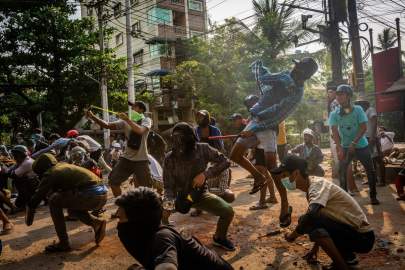Myanmar Protesters Return After Security Forces Kill at Least 90 People

SINGAPORE—Protesters returned to the streets of Myanmar after soldiers and police gunned down at least 90 people across the country in the bloodiest day since the military began its violent campaign to crush opposition to last month’s coup.
Among those killed on Saturday were six children between the ages of 10 and 16 as security forces opened fire in residential areas and into homes, said the Assistance Association for Political Prisoners, a nonprofit that monitors arrests and fatalities. At an 11-year-old girl’s funeral on Sunday, her body lay surrounded by toys, a box of crayons and a hand-drawn sketch of Hello Kitty, photographs in local media showed.
The nonprofit group recorded gunfire and violence against protesters in 40 locations across the country on Saturday, including the two largest cities Yangon and Mandalay, and said the death toll was likely higher than the 90 fatalities it had confirmed. Soldiers dragged some of the bodies off the streets and didn’t return them to the families of the deceased, and the injured who were hauled away later died in detention, the nonprofit group said.
For weeks, security forces have terrorized civilians by shooting protesters and sometimes bystanders in the streets. The displays of force are intended to strike fear and suppress resistance to the Feb. 1 coup, which ended Myanmar’s decadelong shift toward democracy and returned the country to absolute military rule. Aung San Suu Kyi, the ousted civilian leader, has been under detention in her home since her government was deposed, as have dozens of other officials from her political party.
Their absence and the military’s violence hasn’t stopped citizens from mobilizing. The generals face daily demonstrations, a sprawling civil disobedience movement that has paralyzed large parts of Myanmar’s economy and sanctions by the U.S., U.K. and the European Union. But Saturday’s bloodshed showed the armed forces, who have a long history of repression against citizens, have no intention of changing course, raising fears of more loss of life and prolonged chaos turning Myanmar into a failed state.
More than 420 people have been killed in less than two months and nearly 2,500 people are under detention.
Saturday’s killings took place on the country’s Armed Forces Day, an annual holiday that honors the military. Hundreds of soldiers marched in formation in a parade in the capital Naypyitaw and Commander-in-Chief Min Aung Hlaing, who led the coup, made a speech reiterating his promise to hold elections, though he didn’t specify a timeline or elaborate on who would be permitted to contest any such vote.
By nightfall, as the death toll from the day’s shootings began to emerge, he participated in a lavish dinner with a fireworks display and a drone show.
The defense chiefs of a dozen countries, including the U.S., U.K., Germany, Australia and Japan, issued a statement against the use of lethal force against unarmed civilians. “We urge the Myanmar Armed Forces to cease violence and work to restore respect and credibility with the people of Myanmar that it has lost through its actions,” they said.
U.S. Secretary of State Antony Blinken said the bloodshed showed that “the junta will sacrifice the lives of the people to serve the few” and that the country’s courageous people “reject the military’s reign of terror.” The U.K.’s Foreign Secretary Dominic Raab said on Twitter that the killings marked a new low.
Photo: Anticoup protesters used slingshots against approaching security forces on Sunday in Yangon.
PHOTO: GETTY IMAGES
Link: https://www.wsj.com/articles/myanmar-protesters-return-after-security-forces-kill-90-people-including-children-11616942696




